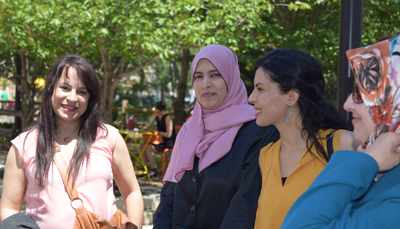Updated
Capacity-Building Tops Morocco’s Social Development Agenda – Jean R. AbiNader
Without Skilled Human Resources, Progress Lags in Meeting Goals
Jean R. AbiNader, MATIC
June 18, 2015
In the last month, a number of news stories have appeared about 16 young professionals from Morocco and Tunisia who are in US for a month-long capacity-building program to broaden their skills, understanding, and insights by exposure to US NGOs and agencies working in similar fields. They are part of the Professional Fellows Program (PFP) sponsored by the United States Department of State, Bureau of Educational and Cultural Affairs.
This particular program is administered by Legacy International “with assistance from multiple in-country Partners from the North African region and the generosity of Fellowship placement hosts” according to Legacy’s website. J.E. Rash, founder and president of Legacy International says that “their mission is to train and mentor community leaders, youth, professionals, and governmental and non-governmental administrators, helping them to develop and implement practical, community-based solutions to critical issues.” And Legacy has been at this important work for more than 30 years.
The impact of the program is obvious from the remarks of the participants. For example, Sara Ait Mouh, an administrator and commercial manager who works for women’s empowerment through entrepeurship in Agadir, commented that “Every day I have new experiences with new non-profits. This has been a very enriching experience for me. At every place, I got a lot of new ideas. Looking at the system as a whole, there are a lot of ideas and technical skills to learn, and I will use them in my home project to train women in practical skills and camaraderie skills.”
The participants come from the public, private, and NGO communities in their home countries, representing a diversity of organizations and needs. The learning that occurs goes both ways – Americans learn about challenges in another culture and recognize both the similarities and differences in options for overcoming those challenges. For the North Africans, this is an opportunity to define concrete project objectives for their time in the US and, more importantly, how they will apply their new understanding and skills for generating innovative solutions back home.
A good example is Limame Barbouchi, the Administrator for the National Initiative for Human Development (INDH) in the Province of Taourirt. His particular concern is empowering girls and women with disabilities to develop their small business capabilities. As part of his US assignment, he developed a four-step effort to launch his program, which includes home visits, a workshop for the program participants, familiarizing them with accessible vocational training programs, and an introdution to what building a small business may involve.
In his blog about his experiences, Limame wrote, “At the professional level, I have learned a lot from the Roanoke based non-profit organization where I did my fellowship, Total Action for Progress (TAP) and all those agencies I could visit through TAP. I have learned how to be honest in what you do, how to love what you do, how to develop a results-oriented strategy for work, and how to develop an organization culture. I would never forget an outstanding professional and personal value which has driven TAP to be what it is nowadays.”
These may seem like small steps, but each participant is a multiplier in their communities and organizations – enabling new ideas and approaches to be brought in at the grassroots level to improve the quality of life in Morocco. The diversity of projects and the constituencies to be served reflect the vision of the Moroccan participants, as they wrote in their goal statements:
- Help needy people to convert from depending on others and charity to independent and active individuals through income generating activities, especially widows and divorced women in cities.
- Improve the standards and standardization of hygiene practices among women training for the restaurant business.
- Empower 15 girls (and eventually 100) with disabilities to become active and productive members of their community through discovering their strengths and talents.
- Sensitization of teachers on the importance of instilling the values of tolerance and self-esteem to elementary school students so that teachers are conscious of values in the transformation of teaching and student behavior.
- Empowerment on entrepreneurship to young people aged 15 to 25 to create a new working class that will have a positive impact on the community.
- Increase civic engagement and volunteerism among university students so that in the next 1-5 years, this will help spread a culture of civic engagement among university students and increase their initiatives of development projects responding to community needs and contributing to real socioeconomic change.
- Empowering school aged children to become more involved in improving the world and reducing materials going to the landfill from their school by setting up the first recycling center in their city.
Hats off to the PFP and Legacy International for an amazing and ambitious program focused on concrete and achievable human development initiatives.

